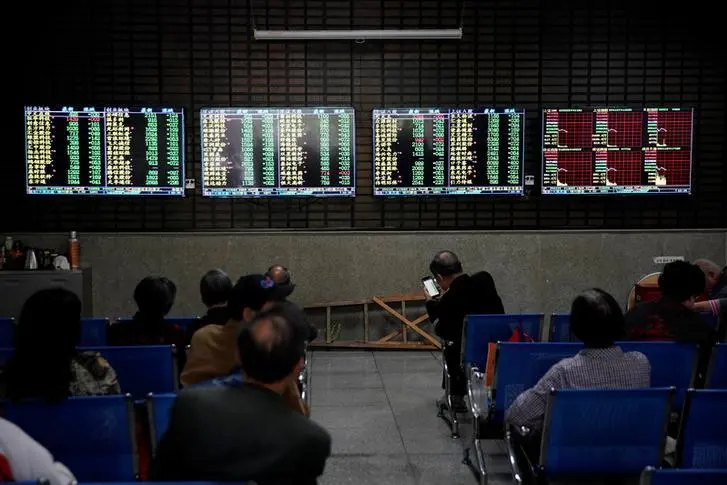PHOTO
China stocks saw another slump on Friday after Monday's panic selling, sending main benchmarks to fresh lows in years amid lingering fears that China's new leadership team under President Xi Jinping would put politics over economic growth.
Recent COVID-19 flare-ups and stringent anti-virus measures also dashed investor hopes of a significant easing of China's zero-COVID policy after the Communist Party Congress, adding to concerns of a dim economic outlook.
** China's blue-chip CSI 300 Index closed down 2.5% on Friday to touch its lowest level in 2-1/2 years, while Hong Kong's Hang Seng Index plunged 3.7% to hit new lows since the 2008-09 global financial crisis.
** Investor sentiment was hit as President Xi secured a precedent-breaking third leadership term and introduced the new Politburo Standing Committee stacked with loyalists.
** "The greater concentration of power under President Xi may lead investors to price in the risk of a continuation of pandemic controls, less support for the private sector, greater geopolitical tensions with the U.S., and heightened risk of policy mistakes," UBS wrote in a note.
** The unexpected results sent the CSI 300 Index down 5.4% for the week, the biggest weekly fall since July 2021. The Hang Seng Index saw its worst week in nearly five years, plunging 8.3%.
** Goldman Sachs said in a Friday note that sentiment was further dampened by fresh COVID outbreaks. Daily new domestic cases increased over the past week, while cities with high- or mid-risk districts increased to nearly 50% of national GDP, approaching a record high, it wrote.
** Analysts at Nomura added there is almost no signs of an easing of the zero-COVID policy since the end of the Party Congress, instead the execution has been clearly stepped up in a rising number of cities. They maintain the view that zero-COVID will continue until at least March 2023.
** Stocks tumbled across the board on Friday, with Hong Kong-listed Chinese tech giants down 5.6% leading the decline. Food delivery giant Meituan plunged 7.6% and social media conglomerate Tencent fell 5.8%.
** Real estate developers, new energy shares and consumer staples listed in the mainland market retreated between 2.5% and 4%.
** Reflecting much more bearish sentiment among global investors toward China, an index measuring the premium of China-listed A-shares over Hong Kong-listed H-shares closed at the highest level since early 2009.
** According to the gauge, mainland-listed shares, which are less vulnerable to foreign selling, are an average 53% more expensive than their Hong Kong counterparts.
** UBS analysts said they remain neutral on Chinese equities. "We are cautious on the short-term path of the Chinese market and avoid making directional calls until greater certainty arrives." (Reporting by Shanghai Newsroom; Editing by Rashmi Aich and Shailesh Kuber)





















